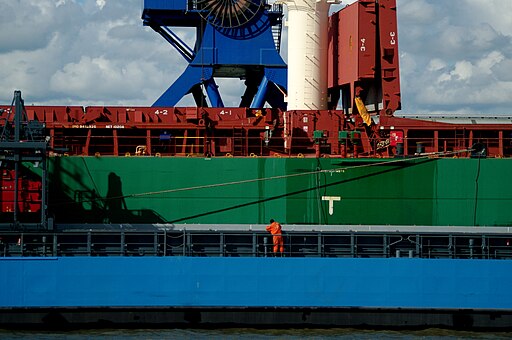Ich stände heute mutterseelenallein und verloren in der Küche.
Aber zum Glück gibt es dieses:
Samstag, 28. Dezember 2013
Freitag, 20. Dezember 2013
Wenn Wikipedianer demonstrieren würden
Dann sähen ihre Plakate so aus:
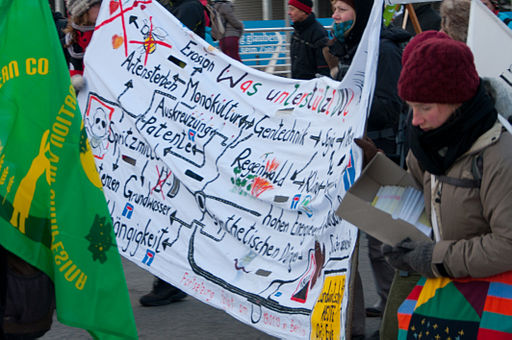
Off Topic und am Rande: Zählt das jetzt eigentlich als Traktorfreitag? Links und Rechts dieses Motivs standen dutzenden Traktoren. Deswegen war ich ja überhaupt da.

Off Topic und am Rande: Zählt das jetzt eigentlich als Traktorfreitag? Links und Rechts dieses Motivs standen dutzenden Traktoren. Deswegen war ich ja überhaupt da.
Labels:
bilder,
traktorfreitag,
Wikipedia,
wirhabenessatt
Dienstag, 17. Dezember 2013
Mittwoch, 11. Dezember 2013
"Sei mutig" gegen die Richtlinien. Ein Duell von 2005 bis 2008 mit klarem Sieger.
Im Jahre 2005 begann der Konflikt, im Jahre 2008 hatte die Bürokratie endgültig gewonnen.
Und noch ein Wort der Erklärung: [[Wikipedia:Sei mutig]] existiert durchaus weiterhin. Und der Löschgrund war nicht, dass "sei mutig" blöd ist, sondern dass Wikipedia-internes nicht in den Artikelnamensraum gehört - was prinzipiell richtig ist. Dennoch ist es natürlich eine wunderschöne (und eher traurige) Parabel des Siegs von Richtlinien, Prinzip und Recht und Ordnung gegen pragmatischen Anarchismus, einfach mal ausprobieren und halt "mutig sein".
Und noch ein Wort der Erklärung: [[Wikipedia:Sei mutig]] existiert durchaus weiterhin. Und der Löschgrund war nicht, dass "sei mutig" blöd ist, sondern dass Wikipedia-internes nicht in den Artikelnamensraum gehört - was prinzipiell richtig ist. Dennoch ist es natürlich eine wunderschöne (und eher traurige) Parabel des Siegs von Richtlinien, Prinzip und Recht und Ordnung gegen pragmatischen Anarchismus, einfach mal ausprobieren und halt "mutig sein".
Dienstag, 10. Dezember 2013
Wissenschaftliche Relevanz ist egal

Kurzer Hinweis auf einen Hinweis nebenan auf eine Studien: eine Studie an der Oxfrod University hat untersucht, welche Professoren Einträge in der englischen Wikipedia haben, und welche nicht. Dann haben sie das ganze mit den üblichen Verfahren verglichen, um in der Wissenschaft Relevanz und Reputation festzustellen.
Resultat: es besteht keinerlei Zusammenhang, die Existenz eines Wikipedia-Artikels (oder seine Länge, die Zahl seiner Bearbeiter etc.) sagt komplett gar nichts über Relevanz oder Reputation eines Wissenschaftlers aus. Zitat: "In short, a scientist having their own Wikipedia entry means—to use a technical term—diddly squat."
Außerdem stellten sie das fest, was auch in der deutschen Wikipedia jetzt nicht so selten ist: “Who is writing Wikipedia articles on academics?” Could it be—gasp—the academics themselves? (Und Disclaimer: es ist jetzt aber auch nicht so häufig, dass die meisten Einträge von den Leuten selber kämen. Aber sicher einige.)
Whole Story: Does Your Professor Have a Wikipedia Entry? Congrats! It Means Nothing
Montag, 9. Dezember 2013
Donnerstag, 5. Dezember 2013
Kein Liveblog von der Wikimedia-MV (mit Text)
Diesmal kein Live-Blog oder Nach-live-Blog, soviel bin ich dann nicht zum Schreiben gekommen. Aber bevor Twitter sie ganz verschluckt hier mal meine Tweets. Ist nicht so sehr anders als sonst, nur einfach deutlich lückenhafter:
(dezent redigiert. d.h vor allem ein paar Nebendiskussionen auf Twitter gelöscht und der Lesbarkeit wegen zeitlich von oben nach unten angeordnet), das heißt es fängt oben an und geht dann chronologisch nach unten.
* es wäre ja nett, wenn es auf der wikimedia.de-startseite irgendeinen hinweis auf die MV geben würde.#woistdiedenn?
* Hurra! Die größten #WMDE-MV-Kaffeetassen aller Zeiten!
(dezent redigiert. d.h vor allem ein paar Nebendiskussionen auf Twitter gelöscht und der Lesbarkeit wegen zeitlich von oben nach unten angeordnet), das heißt es fängt oben an und geht dann chronologisch nach unten.
* es wäre ja nett, wenn es auf der wikimedia.de-startseite irgendeinen hinweis auf die MV geben würde.#woistdiedenn?
* Hurra! Die größten #WMDE-MV-Kaffeetassen aller Zeiten!
Labels:
mv,
wikimedia,
Wikimedia Deutschland,
Wikipedia
Mittwoch, 4. Dezember 2013
Ephemeria

Jemand Lust:?
Ephemeria- - die Enzyklopädiekammer für Unbekanntes, Nebensächliches und Unerwartetes
* Man nehme ein Mediawiki und schreibe über die Welt:
Über alles. Ich betone _alles_
Mit dem Interesting Point of View. Im Zweifel steht der Stadnpunkt im Artikel, der den interessantsten Artikel ergibt
ABER:
(aus pragmatischen Gründen)
* Keine Themen, die "harte" Wikipedia-Relevanzkriterien erfüllen (dafür gibt es ja schon Wikipedia.) Das heißt, dass es durchaus Dopplungen geben kann und zum Beispiel "öffentliche Aufmerksamkeit"kein Ausschlusskriterium ist. Aber zum Beispiel Kampfkünste mit mehr als 10.000 Teilnehmern wären draußen.
* Keine lebenden Personen (wir wollen ja nicht verklagt werden)
* Keine in DACH aktuell aktiven Organisationen (wir wollen ja nicht verklagt werden)
* Keine Müllablage - kein Blindimport aus Wikipedia, sondern redaktionell betreute Artikel
Sonntag, 1. Dezember 2013
Kein Liveblog von der Wikimedia-MV (ohne Text)

Aber mit Link: ein bisschen schrub ich ja doch mit.
Und in den nächsten Tagen dann auch hier mit Text und von oben nach unten.
Labels:
Links,
mv,
wikimedia,
Wikimedia Deutschland,
Wikipedia
Donnerstag, 28. November 2013
Kurz gestubbt: Tempelhofer Ufer 23-24
Das Gebäude Tempelhofer Ufer 23–24 ist ein denkmalgeschütztes Geschäftshaus in Berlin-Kreuzberg. Es wurde 1913-1919 von Cremer & Wolfenstein als Verwaltungsgebäude für den Lokomotivenhersteller Orenstein & Koppel hergestellt.
Das Gebäude ist ein typisches Verwaltungsgebäude seiner Zeit, und bildete einst den Hauptteil eines Komplexes, der sich über den ganzen Block erstreckte. Zwischenzeitlich nutzte der Textilienhersteller "Alois Heinze. Röcke" und die Hochschule der Künste das Gebäude, heute hat es verschiedene Mieter.
Das Gebäude ist ein typisches Verwaltungsgebäude seiner Zeit, und bildete einst den Hauptteil eines Komplexes, der sich über den ganzen Block erstreckte. Zwischenzeitlich nutzte der Textilienhersteller "Alois Heinze. Röcke" und die Hochschule der Künste das Gebäude, heute hat es verschiedene Mieter.
Labels:
Berlin,
kurzgestubbt,
tu23,
wikimedia,
Wikipedia
Dienstag, 26. November 2013
Nicht-mehr-live-aber-weiterhin-unkoordiniert-bloggen von #Wikicon2013
Weiterhin erstmal mit ein paar gesammelten Eindrücke:
* der schon angesprochene Talk von Lukas Mezger war ein spannender - der hat einfach was zu sagen, und kann das. Auch wenn es leichten Diskussionsdissenz zum Thema gab welche Daten Wikimedia wann wie erhebt und erheben sollte. Damit hat er zwar eigentlich nichts zu tun, aber wer schon je ein (WMF) am Benutzernamen hatte, ist im Zweifel halt mitverantwortlich.
* mein Bar-Camp-Workshop "PR powerflauschen" war bewegt - auch wenn mir immer noch nicht klar ist, warum Leute Unhöflichkeit für ein sozialadequates Verhalten halten, das auch nur ein Problem auf dieser Welt löst.
* Achim hat mir morgens um neun Schnaps in die Hand gedrückt, und ich habe Minuten danach erfahren, dass dpa nachmittags mit mir reden will, und ich da besser noch zurechnungsfähig sein sollte. bäh.
* Allgemein: ich habe mehr Talks gesehen als auf den meisten Konferenzen auf denen ich war. Lag vielleicht aber auch an der Kaffee-Sitzsack-Situation, die das so-allgemein-abhängen-und-reden etwas erschwerte.
* So mittelgute Talks, die forderten, dass auf Wiki-Konferenzen stärker selektiert und nur noch tolle Talks angeboten werden sollten.
* Spannend: Gereon, der erzählte, wer einen so alles anruft, wenn man seinen Namen auf [[Wikipedia:Presse]] stehen hat. Vor allem wohl keine Presse.
* Total großartig: der externe Juror bei der Wiki-Loves-Monuments-Preisverleihung. Etwas antiklimatisch: dass die Preisverleihung mit dem 1. Platz losging und sich dann bis zum 100. vorarbeitete.
* Diverse neue spannende Wikipedianer getroffen. Und viele alte spannende.
* Wetter war besser als in Dornbirn und weniger heiss als in Hongkong.
* Große Männer, die begeistert wie kleine Kinder auf Drohnen schauen.
* der schon angesprochene Talk von Lukas Mezger war ein spannender - der hat einfach was zu sagen, und kann das. Auch wenn es leichten Diskussionsdissenz zum Thema gab welche Daten Wikimedia wann wie erhebt und erheben sollte. Damit hat er zwar eigentlich nichts zu tun, aber wer schon je ein (WMF) am Benutzernamen hatte, ist im Zweifel halt mitverantwortlich.
* mein Bar-Camp-Workshop "PR powerflauschen" war bewegt - auch wenn mir immer noch nicht klar ist, warum Leute Unhöflichkeit für ein sozialadequates Verhalten halten, das auch nur ein Problem auf dieser Welt löst.
* Achim hat mir morgens um neun Schnaps in die Hand gedrückt, und ich habe Minuten danach erfahren, dass dpa nachmittags mit mir reden will, und ich da besser noch zurechnungsfähig sein sollte. bäh.
* Allgemein: ich habe mehr Talks gesehen als auf den meisten Konferenzen auf denen ich war. Lag vielleicht aber auch an der Kaffee-Sitzsack-Situation, die das so-allgemein-abhängen-und-reden etwas erschwerte.
* So mittelgute Talks, die forderten, dass auf Wiki-Konferenzen stärker selektiert und nur noch tolle Talks angeboten werden sollten.
* Spannend: Gereon, der erzählte, wer einen so alles anruft, wenn man seinen Namen auf [[Wikipedia:Presse]] stehen hat. Vor allem wohl keine Presse.
* Total großartig: der externe Juror bei der Wiki-Loves-Monuments-Preisverleihung. Etwas antiklimatisch: dass die Preisverleihung mit dem 1. Platz losging und sich dann bis zum 100. vorarbeitete.
* Diverse neue spannende Wikipedianer getroffen. Und viele alte spannende.
* Wetter war besser als in Dornbirn und weniger heiss als in Hongkong.
* Große Männer, die begeistert wie kleine Kinder auf Drohnen schauen.
Labels:
karlsruhe,
wikicon,
wikicon2013,
Wikipedia
Samstag, 23. November 2013
Fast-vielleicht irgendwie Liveblog von #Wikicon2013
Bloggen gegen den ablaufenden Akku..
Kurzfazit: Leute super drauf, alles super organisiert, spannende Inhalte, lange Wege, und der Kaffee ist nicht da wo ich bin. Ick freu mir hier zu sein.
Ein paar Stichpunkte: jetzt gerade im Keller eines seltsamen Karlruher Uni-Gebäudes, wo uns Lukas Mezger gleich was zu Stand von Markenrechten, Datenschutz etc. erklären wird.
Mein eigener Vortrag ("Instutitionalisierter Dialog mit der Community") war Meta-Meta absichtlich, und damit schon alles sehr abstrakt. Aber das sollte ja so.
Presse ist da, aber übersichtlich.
Alle superlieb.
Kaffee ist im 1. Stock, Sitzsäcke im Keller. Ich prangere das an!
Juhu! Gleich gibt es bunte Bilder.
Jetzt geht talk los. Ich fühle mich verpflichtet, zuzuhören.
Kurzfazit: Leute super drauf, alles super organisiert, spannende Inhalte, lange Wege, und der Kaffee ist nicht da wo ich bin. Ick freu mir hier zu sein.
Ein paar Stichpunkte: jetzt gerade im Keller eines seltsamen Karlruher Uni-Gebäudes, wo uns Lukas Mezger gleich was zu Stand von Markenrechten, Datenschutz etc. erklären wird.
Mein eigener Vortrag ("Instutitionalisierter Dialog mit der Community") war Meta-Meta absichtlich, und damit schon alles sehr abstrakt. Aber das sollte ja so.
Presse ist da, aber übersichtlich.
Alle superlieb.
Kaffee ist im 1. Stock, Sitzsäcke im Keller. Ich prangere das an!
Juhu! Gleich gibt es bunte Bilder.
Jetzt geht talk los. Ich fühle mich verpflichtet, zuzuhören.
Freitag, 8. November 2013
Gibt es Forschungen zur Stärkung mikrourbaner sozialer Zusammenhänge durch die Expansion des Online-Handels?
Mal ehrlich: die ganze Nachbarschaft hier lernt sich doch immer nur kennen, wenn der eine beim anderen Hermes/Post/dpd/etc-Pakete abholen muss. Völkerverbindung durch Online-Shopping!
Dienstag, 5. November 2013
Stell' Dir vor, Du hast einen Ballsaal groß genug für Tractorpulling?
Was würdest Du drin machen? (und, okay, eher lawn mower pulling auf kurzer Strecke)
Samstag, 12. Oktober 2013
Donnerstag, 10. Oktober 2013
Montag, 30. September 2013
Ballettmontag: Explosionen
Es ist eine Sauerei. Explosionen scheinen im Ballett nicht vorzukommen. Wie konnte das passieren? Nicht mal Feuerwerk. Aber immerhin Pyroshows. Ein kleiner Blick in die Aufführung Dracul, Prince of Fire, über deren Hintergründe ich bisher genau gar nichts weiß:
Freitag, 27. September 2013
Die verschwundene Wikipedia
Deutsches Version dieses englischen Blogposts
Manchmal, wenn ich mich mit anderen Wikipedianern unterhalte, versuche ich alt und weise zu klingen. Und ich rede über die Zeiten, als es noch gar keine Wikipedianer gab, und alle Datenbanken liefen auf einem einzigen Server, der von Hamstern angetrieben wurde. Um in der weiten Öden des IRCs jemand zu treffen, musste man sich Tage vorher verabreden. Alle Regeln und Bearbeitungshinweise der Wikipedia, ausgedruckt auf A4, waren weniger als zehn Seiten lang.
Das waren die Zeiten, in denen ich Menschen erzählte „ich bin bei Wikipedia“. Und die Antwort war „Ah, ja, ne, is klar, wasauchimmer“ Ich: „Und jeder kann mitmachen“ - „Ah, ja, ne, is klar, wasauchimmer“. Ich: „Eines Tages wird es eine freie Onlineenzyklopädie sein“-- „Ah, ja, ne, is klar, wasauchimmer“ Bis heute vermute ich innerlich immer, dass Menschen so auf Wikipedia reagieren, und bin jedesmal sehr überrascht, wenn es anders kommt.
So viel hat sich seit 2003 geändert. Beim Schreiben des Blogposts sitze ich in Hongkong auf der Wikimania. Die Weltpresse interessiert sich dafür, was Jimbo in einer Rede sagt. Und vor allem: Wikipedia ist tatsächlich praktisch und taugt als Nachschlagewerk. Wenn ich mich auf fremden Kontinenten mit wildfremden Leuten über mein Hobby unterhalte, wissen diese Menschen im Normalfall wovon ich rede. Und viele, viele Menschen interessieren sich stark dafür, was in Wikipedia steht: Menschen, die niemals auch nur einen Edit gemacht haben oder machen werden. Tatsächlich, die Erfolgsgeschichte der Wikipedia fasziniert mich jeden Tag wieder.
Aber natürlich wäre es anmaßend, davon auszugehen, dass Wikipedia an genau dieser Stelle aufhört, sich weiterzuentwickeln. Es wäre anmaßend davon auszugehen, dass Wikipedia sich nicht mehr verändern wird.
Was wird im Jahr, sagen wir mal 2022, passieren? Warum versuchen wir nicht einfach mal einen Blick in die Glaskugel?
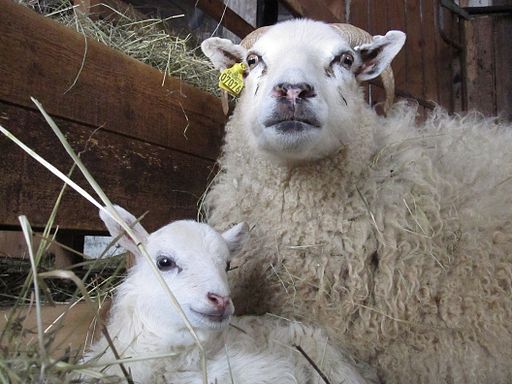
Die gute Nachricht: im Jahr 2022 existiert Wikipedia noch. Die schlechte Nachricht: Niemand weiß davon
Manchmal, wenn ich mich mit anderen Wikipedianern unterhalte, versuche ich alt und weise zu klingen. Und ich rede über die Zeiten, als es noch gar keine Wikipedianer gab, und alle Datenbanken liefen auf einem einzigen Server, der von Hamstern angetrieben wurde. Um in der weiten Öden des IRCs jemand zu treffen, musste man sich Tage vorher verabreden. Alle Regeln und Bearbeitungshinweise der Wikipedia, ausgedruckt auf A4, waren weniger als zehn Seiten lang.
Das waren die Zeiten, in denen ich Menschen erzählte „ich bin bei Wikipedia“. Und die Antwort war „Ah, ja, ne, is klar, wasauchimmer“ Ich: „Und jeder kann mitmachen“ - „Ah, ja, ne, is klar, wasauchimmer“. Ich: „Eines Tages wird es eine freie Onlineenzyklopädie sein“-- „Ah, ja, ne, is klar, wasauchimmer“ Bis heute vermute ich innerlich immer, dass Menschen so auf Wikipedia reagieren, und bin jedesmal sehr überrascht, wenn es anders kommt.
So viel hat sich seit 2003 geändert. Beim Schreiben des Blogposts sitze ich in Hongkong auf der Wikimania. Die Weltpresse interessiert sich dafür, was Jimbo in einer Rede sagt. Und vor allem: Wikipedia ist tatsächlich praktisch und taugt als Nachschlagewerk. Wenn ich mich auf fremden Kontinenten mit wildfremden Leuten über mein Hobby unterhalte, wissen diese Menschen im Normalfall wovon ich rede. Und viele, viele Menschen interessieren sich stark dafür, was in Wikipedia steht: Menschen, die niemals auch nur einen Edit gemacht haben oder machen werden. Tatsächlich, die Erfolgsgeschichte der Wikipedia fasziniert mich jeden Tag wieder.
Aber natürlich wäre es anmaßend, davon auszugehen, dass Wikipedia an genau dieser Stelle aufhört, sich weiterzuentwickeln. Es wäre anmaßend davon auszugehen, dass Wikipedia sich nicht mehr verändern wird.
Was wird im Jahr, sagen wir mal 2022, passieren? Warum versuchen wir nicht einfach mal einen Blick in die Glaskugel?

Die gute Nachricht: im Jahr 2022 existiert Wikipedia noch. Die schlechte Nachricht: Niemand weiß davon
Labels:
2022,
dasgroßeganze,
visionen,
wikimania 2013,
Wikipedia
Sonntag, 22. September 2013
The Onion analysiert Wikipedia Gender-Gap-Problem
Area Man’s Intelligence Probably Just Too Intimidating For Most Women
“It’s tough, because I really try my best to relieve their anxiety and say, ‘Hey, look, don’t sweat it, I’m used to people not being able to keep up with my mind,’” added Walker. “But that never seems to help."
Dienstag, 17. September 2013
Der Bonus, wenn man seine Handynummer im Internet veröffentlicht
Sonntag, 15. September 2013
Samstag, 14. September 2013
Darummagichwikipedia (I)

..man lernt an einem Abend von einer Person so nebenbei kompetentes spannendes über Unterseekabel in Färöer, den arabischen Q/Kh-Laut und die Indy 500. (Und wenn man sich dann noch mal umdreht kommt die Frühgeschichte von DeBeers, Lebedamen des mittleren 20. Jahrhunderts, den höchsten Berg Kölns, Müllverbrennungsanlagen, Bahnradsport und wasweißich noch alles dazu) Danke für den schönen Abend an den Düsseldorfer Stammtisch. Wenn die Veranstaltung heut' in Aachen nur halb so nett wird, wie der Stammtisch gestern, bin ich mehr als glücklich.
Freitag, 13. September 2013
Traktorfreitag: Ich fahr' Zug
Heute nur ein kurzer Post: ich bin schon fast auf dem Weg zum Bahnhof, um Samstag in Aachen über Paid Editing zu reden. Und dann am Samstag drauf in Leipzig. Ich bin sehr gespannt, und freue mich sehr. Für jetzt aber ist Paid Editing vollkommen egal, denn es geht um Traktoren. Und siehe da, auch Traktoren fahren Zug:
Nicht ratsam ist es übrigens nach Tractor/Train/Explosion zu suchen. Da gibt es wirklich häßliche Videos im Internet.
Nicht ratsam ist es übrigens nach Tractor/Train/Explosion zu suchen. Da gibt es wirklich häßliche Videos im Internet.
Montag, 9. September 2013
Southparks erstes Gesetz des Wikipedia-Stils
In Stildiskussionen wird sich langfristig immer die Variante mit mehr Silben durchsetzen::
siehe zum Beispiel:
Anmerkungen/Quellen/Einzelnachweise
Radweg/Radverkehrsanlage
Beamer/Videoprojektor
amerikanisch/us-amerikanisch
siehe zum Beispiel:
Anmerkungen/Quellen/Einzelnachweise
Radweg/Radverkehrsanlage
Beamer/Videoprojektor
amerikanisch/us-amerikanisch
Freitag, 6. September 2013
Traktorfreitag: Kunst
Commons ist schön. Commons ist voller überraschender Kategorien. Wie zum Beispiel "Tractors in art."
Leider scheint die bildende Kunst sich bisher nicht sehr mit Traktoren auseinandergesetzt zu haben. Aber immerhin gibt es Volkskunst und Kunstvoll verzierte Traktoren. Für den Einstieg ins Wochenende: Enjoy!
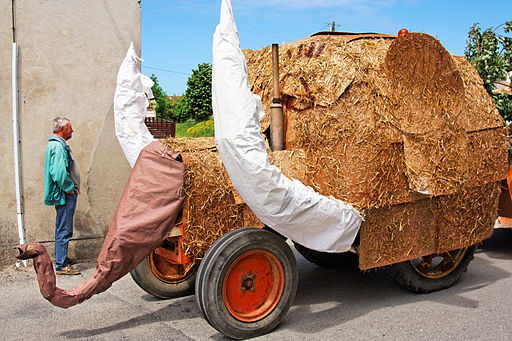
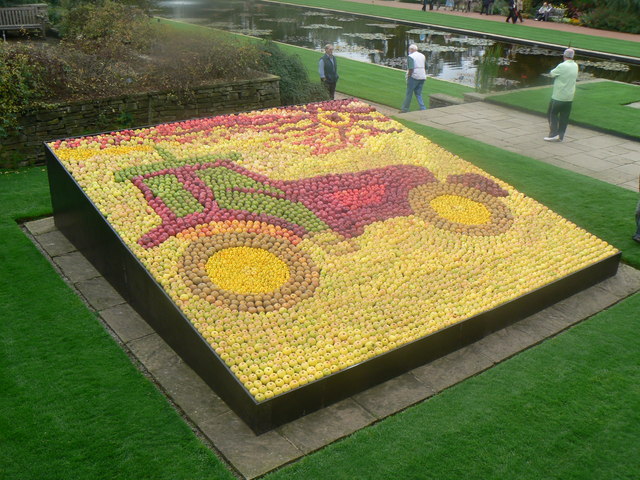



Und mein persönlicher Liebling:

Leider scheint die bildende Kunst sich bisher nicht sehr mit Traktoren auseinandergesetzt zu haben. Aber immerhin gibt es Volkskunst und Kunstvoll verzierte Traktoren. Für den Einstieg ins Wochenende: Enjoy!





Und mein persönlicher Liebling:

Labels:
bilder,
elefant,
freitag,
kirchenfenster,
Kunst,
Traktor,
traktorfreitag
The Community Project Budget strikes again.

Liebe Blog-Leser,
sie kennen das CPB (Community-Projekt-Budget) von Wikimedia Deutschland ja bereits aus den großen Blog Erfolgen "die Millionenliste" oder "der erste CPB-Ausschuss löst sich unter Getöse auf" oder "Stress mit dem zweiten Ausschuss" oder "meine zurückgezogenen Anträge" oder "mein nicht-zurückgezogener Antrag."
Nun geht die Erfolgsgeschichte in eine neue Runde. Ausgehend von diesem Antrag trifft sich eine Arbeitsgruppe [...], die auf Basis der erarbeiteten Analyse Änderungsvorschläge erarbeitet und auf der nächsten Mitgliederversammlung vorstellt. Die Arbeitsgruppe besteht aus Vertretern der für das Thema relevanten Interessengruppen (z.B. Communitys, Vereinsführung, Mitarbeiter, Projektdurchführer).
Die AG trifft sich zum 1. Treffen der Arbeitsgruppe am Sonntag, 8.9.2013 in der Geschäftsstelle von Wikimedia Deutschland: Und ich bin dabei. Wie es aussieht, kann ich sogar mitbloggen oder nachbloggen oder fast-live-Twittern oder ähnliches. Ich bin gespannt.
Und ich kann hier und jetzt natürlich Anregungen, Fragen, Vorwürfe, Ideen, Kuscheltiere und Wurfwattebäuschen einsammeln. Wer was bei mir loswerden will, melde sich bitte.
Update: Sebaso verdanke ich den Hinweis, dass es sogar einen Link auf den Antrag ohne Anmeldezwang gibt. Ist geändert.
Labels:
cpb,
cpbag,
freitagabernichttraktorfreitag,
wikimedia,
Wikipedia
Donnerstag, 5. September 2013
Freitag, 30. August 2013
Traktorfreitag: Explosion
Mal bakc to the roots mit einer schlicht-eleganten Explosion. Bonuspunkte, weil das Video offensichtlich in Schleswig-Holstein gedreht wurde.
Labels:
Explosion,
Traktor,
traktorfreitag,
Videos
Sachen im Leben, von denen ich auch nie gedacht hätte, dass ich sie mal machen würde:
Donnerstag, 29. August 2013
Prüf' Dein [WMDE]-Präsidium
Die Lage ist dramatisch! WMDE wächst und wächst und aus dem netten Kuschelverein von einst ist eine Mitgliederstarke Organisation geworden. Das hat viele Folgen, von denen mich jetzt gerade eine interessiert: die Menschen kennen sich nicht mehr.
Das ist aus zwischenmenschlich-emotionalen Gründen bedauerlich, hat aber auch eine eher politische Folge: die Kandidaten für Ämter (sprich hier: das Präsidium) sind nicht mehr allgemein bekannt. Wer weiß schon, wer sein Möchtegern-Präside wirklich ist?

Auf die Mitgliedsversammlungen kommen erfahrungsgemäß 30 bis 50 Menschen, die restlichen Vereinsmitglieder sind im Wesentlichen auf die Selbstvorstellung der Kandidaten angewiesen. Das ist suboptimal.
Um die Vorstellungs- und Entscheidungsmöglichkeiten etwas breiter zu fassen, hatten verschiedene Leute die Idee von Wahlprüfsteinen für Präsidialkandidaten. Alle Kandidaten bekommen eine Reihe von Fragen und können/sollen diese beantworten. Fragen und Antworten kennen die Wähler im Voraus.
Um die Wahlprüfsteine auf eine möglichst breite Basis zu stellen, gibt es eine Seite in Wikipedia zu Erarbeitung,. Wikipedia:WMDE-Wahlprüfsteine.
Und deshalb hier der Aufruf/Hinweis: wenn ihr wollt, dass die Präsidiums Wähler Eure Meinung/Fragen/Sorgen/Ideen mitbekommen, jetzt ist der richtige Zeitpunkt aktiv zu werden. Jetzt ist Beteiligung angesagt,
Das ist aus zwischenmenschlich-emotionalen Gründen bedauerlich, hat aber auch eine eher politische Folge: die Kandidaten für Ämter (sprich hier: das Präsidium) sind nicht mehr allgemein bekannt. Wer weiß schon, wer sein Möchtegern-Präside wirklich ist?

Auf die Mitgliedsversammlungen kommen erfahrungsgemäß 30 bis 50 Menschen, die restlichen Vereinsmitglieder sind im Wesentlichen auf die Selbstvorstellung der Kandidaten angewiesen. Das ist suboptimal.
Um die Vorstellungs- und Entscheidungsmöglichkeiten etwas breiter zu fassen, hatten verschiedene Leute die Idee von Wahlprüfsteinen für Präsidialkandidaten. Alle Kandidaten bekommen eine Reihe von Fragen und können/sollen diese beantworten. Fragen und Antworten kennen die Wähler im Voraus.
Um die Wahlprüfsteine auf eine möglichst breite Basis zu stellen, gibt es eine Seite in Wikipedia zu Erarbeitung,. Wikipedia:WMDE-Wahlprüfsteine.
Und deshalb hier der Aufruf/Hinweis: wenn ihr wollt, dass die Präsidiums Wähler Eure Meinung/Fragen/Sorgen/Ideen mitbekommen, jetzt ist der richtige Zeitpunkt aktiv zu werden. Jetzt ist Beteiligung angesagt,
Labels:
wahlprüfsteine,
Wikimedia Deutschland,
Wikipedia
Mittwoch, 28. August 2013
The Hidden Wikipedia
2022: Let's take a
guess.
Sometimes when talking to Wikipedians I try to sound very old and wise. And I start to talk about those days, when Wikipedia was written by actually nobody, the databases were running on one server powered by a hamster wheel etc. To meet someone on IRC you had to plan days in advance etc., all the written rules of all the Wikipedias could be printed out on less than ten pages.
These were the days when you told somebody "I'm at Wikipedia." and the answer was: "Ah, yeah, sure, whatever." I: "Someday it will be a free online encyclopedia" - "Ah, yeah, sure, whatever." I: "And everybody can edit" - "Ah, yeah. sure, whatever". Goes away. Until today this is the default reaction I expect, and 'til today I'm always surprised when people react differently.
So much has changed since 2003. I'm sitting in Hong Kong right now, the world press cares what Jimbo says at a keynote and most notably: Wikipedia is actually useful to look things up. When talking to strangers on the street on different continents, these people know what I'm talking about. And many, many people care about what is written inside, people who have never edited Wikipedia themselves. Actually, I'm amazed by this Wikipedia-story-of-success every day of my life.
But of course it would be presumptuous to assume that Wikipedia will stop at this place and time. It is pretentious to assume Wikipedia won't change anymore. It will change. What way will it take? What will happen in, hm, 2022? Why don't we just take a guess?
Let's take a guess.
The good thing: Wikipedia will still exist in 2022. The bad news: nobody will know.
The good thing: Wikipedia still exists now in 2022. The bad news: nobody knows. Due to new semantic Wikis, Wikidata, mobile apps etc. almost nobody ever visits the website anymore, this huge lump of text illustrated by an eccentric image load of stuff some hobby photographers liked about their own pictures.
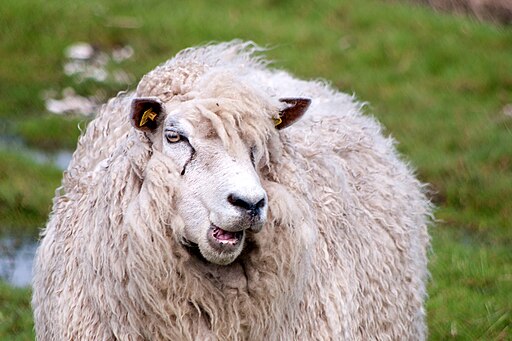
Through a host of apps, information comes custom tailored for different people at different times. This information is read to them, transformed into videos or given to them in small bits by mobile. There are a lot of shiny surfaces, where one can get Wikipedia-information without having to bother about the encyclopedia and all the boring stuff surrounding it.
Many people contribute in many different ways. Most of Wikipedia's content is delivered by partners. Bots plunder archives of many institutions and upload all their content bits to Wikipedia and Commons. A diverse set of people from all over the world, tags this content, assesses it, gives it point-values, and likes or dislikes it. Other bots aggregate these interactions. These aggregation bots produce content specifically aimed at different readers. Beneath/around Wikipedia is a huge archive of material that gets aggregated in several ways. Wikipedia - aggregation by text writing - is just one way one can access the information. This way though is still the way preferred by the "young (and not so young) and educated".
To actually edit the Wikipedia itself one has to have master access. Editing Wikipedia is the only way on which people can actually break something and do harm to the project. So access is limited. The right to edit Wikipedia has to be earned through successful work in the wider Wikipedia ecosphere. Only some freaks - nerdy graduate students, former graduate-students and would-be graduate students of older age - edit the Wiki. Everybody else is happy just producing content.
Don't see it
Do you remember the old times when one had to visit a real website with huge lumps of text? The website was kind of white. It had some pictures that were more or less appealing; many sunsets. And it had a lot of text. Sometimes it had well written text, most of the times it had not-so-well-written text. Everything could be found, but it took a lot of effort. Many people were excluded because it was so difficult to get the relevant information.

Not anymore. Today your phone, car, house, social network, newspaper and doormat give you information you desire. The freezer still does not order the milk by itself, but it is able to sing the best quotes about milk, taken from Wikiquote. Or theses appliances give you some information you maybe desire. Targeting is still a problem. But why should one visit this large, confusing website to get some information that is badly targeted as well.
The Wikimedia Foundation and some of the bigger chapters tried between 2014 and 2018 to develop these apps and software themselves. But still they were way to slow. Can you imagine? The actually tried to include the community in the process. It was a process that was as undemocratic as it was slow and ineffective. The Wikimedia-efforts were much too concerned with preserving Wikipedia the way it was. No real change is possible when involving a community. Their attempts never took off. It couldn't be really successful. So the race was made by more ruthless and more effective competition.
When Wikidata took off, when Wolfram Alpha was able to blend Wikipedia and Wikidata information with nice movies and pictures, when Google decided to be ruthless in mining Wikipedia - these players made the apps that show Wikipedia to the world. Since most people never get to the Website anymore, the Wikimedia movement receives a lot less donations. Of course Wolfram Alpha, Google and Wikiweibo pay all the bills to run Wikipedia. But of course they really like to pay for stuff that makes Wikipedia easy accessible to them.
Now in 2022 for most of the people Wikipedia looks and feels like any other website. For the most apps information is lumped together from several sources. "Reading Wikipedia" is taught in graduate school course. Really curious people are actually the only ones still reading the website and the encyclopedia.
The website still exists. Due to the change in community the texts are better written than they were in 2013 and since 2018 actually the search engine works. But still: Wikipedia is only for people who really really want to know and delve deep. This is not a majority (or even a sizable minority) of humankind.
Don't write it
In 2015 the Foundation gave finally up on the community, and decided to let the community be itself. The decision was made to not mingle with it anymore and just ignore it. No more attempts to create diversity or to introduce newbies into the community. Just let it be and create new, easier to handle communities.
Wiki Loves Monuments lead the way and the visual editor paved the road. Don't introduce people into this stiff conservative community where people had to master a steep learning curve to accomplishing anything. Just give them something nice to do where people can contribute. Make it easy for newbies. No hassle, to arguments, no unfriendliness.

The first apps for "limited editing without breaking anything" (by mobile, by apps, just doing small things) had been developed and could be used much better for outreach. The first, of course, was a Wiki Loves Monuments app. Just photograph an old building, give your GPS coordinates and let the app find the building and categorize the picture. This not only works for monuments but for art, streets, schools, museums, cars, trains etc.
For fine tuning there was another app on which people could correct the algorithms. Also there were apps where people could rate how well a sentence defined its theme, which picture they liked better as illustration for an article, and a multiple-choice quiz, where people could rate true or wrong content. The questions of these quizzes were derived from the text.
Suddenly all kinds of people could contribute easily and doing Wikipedia became popular as a hobby again. It was possible to contribute in a moving car, with limited bandwidth. All knowledge required could be as little as s strong like or dislike for a picture. It was possible to edit on the run, on the go and almost on the sleep.
The hard part was the translation of these contents into encyclopedic content. easy integration was done by bots, a lot of the workload was done by the still-existing-community of encyclopedists and some of it was done by paid facilitators.
The old community with its obnoxious behavior was hidden behind a layer of nice, easy to use tools. Nice, easy to talk to facilitators helped each other out. Infighting still occurred, but on a lesser level. Most of the fights were fought a long time ago. A lot of really difficult people had left Wikipedia to have more impact somewhere else. The inner core of encyclopedists was not so keen on fighting. The fights that still happened, did happen a lot of time out of tradition.
Upload it
At the same time, GLAMS, new Glams, and "maybe-Glams" took off. Paid uploading of material on Wikisource or Wikicommons became the norm. So much new content could be created by plundering institutions. They had the real content. They had big waggonloads of it. Just go there, convince them. Let bots do the initial curating and let people on apps do the rest.
All the institutions had their presence on one the projects, and of course it was possible to integrate an institution and Wikipedia so seamless that the institution could use all content with anybody noticing. The GLAMs (new-glams, maybe-glams) gave content and had the whole Wikipedia to integrate it into. While Wikipedia became a huge institutional archive, a lot of exhibitions became reorganized Wikipedia content without anybody noticing.
The chosen few
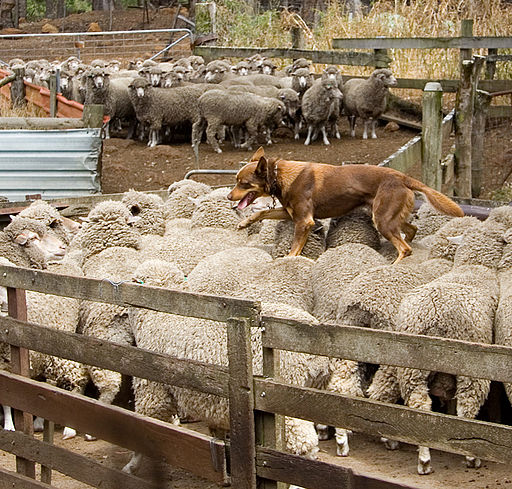
So what about Wikipedia? It strives. It's nice. Being Wikipedian is an honor. One has hard to work to achieve this status. The people who care about Wikipedia the website are mostly old and educated and they know a lot. Of course it's less fun than it's used to be: less brilliance, less innovation, more routine and day-to-day stuff. But there is more relaxed routine, more standards, quiet effective work hidden deep inside a giant knowledge machine. As an editor one learns a lot of new stuff every day. It's fascinating and boring at the same time. Wikipedia the website still has impact, but only a few know why.
For context. Und für noch mehr Kontext (German)
Sometimes when talking to Wikipedians I try to sound very old and wise. And I start to talk about those days, when Wikipedia was written by actually nobody, the databases were running on one server powered by a hamster wheel etc. To meet someone on IRC you had to plan days in advance etc., all the written rules of all the Wikipedias could be printed out on less than ten pages.
These were the days when you told somebody "I'm at Wikipedia." and the answer was: "Ah, yeah, sure, whatever." I: "Someday it will be a free online encyclopedia" - "Ah, yeah, sure, whatever." I: "And everybody can edit" - "Ah, yeah. sure, whatever". Goes away. Until today this is the default reaction I expect, and 'til today I'm always surprised when people react differently.
So much has changed since 2003. I'm sitting in Hong Kong right now, the world press cares what Jimbo says at a keynote and most notably: Wikipedia is actually useful to look things up. When talking to strangers on the street on different continents, these people know what I'm talking about. And many, many people care about what is written inside, people who have never edited Wikipedia themselves. Actually, I'm amazed by this Wikipedia-story-of-success every day of my life.
But of course it would be presumptuous to assume that Wikipedia will stop at this place and time. It is pretentious to assume Wikipedia won't change anymore. It will change. What way will it take? What will happen in, hm, 2022? Why don't we just take a guess?
Let's take a guess.
The good thing: Wikipedia will still exist in 2022. The bad news: nobody will know.
The good thing: Wikipedia still exists now in 2022. The bad news: nobody knows. Due to new semantic Wikis, Wikidata, mobile apps etc. almost nobody ever visits the website anymore, this huge lump of text illustrated by an eccentric image load of stuff some hobby photographers liked about their own pictures.

Through a host of apps, information comes custom tailored for different people at different times. This information is read to them, transformed into videos or given to them in small bits by mobile. There are a lot of shiny surfaces, where one can get Wikipedia-information without having to bother about the encyclopedia and all the boring stuff surrounding it.
Many people contribute in many different ways. Most of Wikipedia's content is delivered by partners. Bots plunder archives of many institutions and upload all their content bits to Wikipedia and Commons. A diverse set of people from all over the world, tags this content, assesses it, gives it point-values, and likes or dislikes it. Other bots aggregate these interactions. These aggregation bots produce content specifically aimed at different readers. Beneath/around Wikipedia is a huge archive of material that gets aggregated in several ways. Wikipedia - aggregation by text writing - is just one way one can access the information. This way though is still the way preferred by the "young (and not so young) and educated".
To actually edit the Wikipedia itself one has to have master access. Editing Wikipedia is the only way on which people can actually break something and do harm to the project. So access is limited. The right to edit Wikipedia has to be earned through successful work in the wider Wikipedia ecosphere. Only some freaks - nerdy graduate students, former graduate-students and would-be graduate students of older age - edit the Wiki. Everybody else is happy just producing content.
Don't see it
Do you remember the old times when one had to visit a real website with huge lumps of text? The website was kind of white. It had some pictures that were more or less appealing; many sunsets. And it had a lot of text. Sometimes it had well written text, most of the times it had not-so-well-written text. Everything could be found, but it took a lot of effort. Many people were excluded because it was so difficult to get the relevant information.

Not anymore. Today your phone, car, house, social network, newspaper and doormat give you information you desire. The freezer still does not order the milk by itself, but it is able to sing the best quotes about milk, taken from Wikiquote. Or theses appliances give you some information you maybe desire. Targeting is still a problem. But why should one visit this large, confusing website to get some information that is badly targeted as well.
The Wikimedia Foundation and some of the bigger chapters tried between 2014 and 2018 to develop these apps and software themselves. But still they were way to slow. Can you imagine? The actually tried to include the community in the process. It was a process that was as undemocratic as it was slow and ineffective. The Wikimedia-efforts were much too concerned with preserving Wikipedia the way it was. No real change is possible when involving a community. Their attempts never took off. It couldn't be really successful. So the race was made by more ruthless and more effective competition.
When Wikidata took off, when Wolfram Alpha was able to blend Wikipedia and Wikidata information with nice movies and pictures, when Google decided to be ruthless in mining Wikipedia - these players made the apps that show Wikipedia to the world. Since most people never get to the Website anymore, the Wikimedia movement receives a lot less donations. Of course Wolfram Alpha, Google and Wikiweibo pay all the bills to run Wikipedia. But of course they really like to pay for stuff that makes Wikipedia easy accessible to them.
Now in 2022 for most of the people Wikipedia looks and feels like any other website. For the most apps information is lumped together from several sources. "Reading Wikipedia" is taught in graduate school course. Really curious people are actually the only ones still reading the website and the encyclopedia.
The website still exists. Due to the change in community the texts are better written than they were in 2013 and since 2018 actually the search engine works. But still: Wikipedia is only for people who really really want to know and delve deep. This is not a majority (or even a sizable minority) of humankind.
Don't write it
In 2015 the Foundation gave finally up on the community, and decided to let the community be itself. The decision was made to not mingle with it anymore and just ignore it. No more attempts to create diversity or to introduce newbies into the community. Just let it be and create new, easier to handle communities.
Wiki Loves Monuments lead the way and the visual editor paved the road. Don't introduce people into this stiff conservative community where people had to master a steep learning curve to accomplishing anything. Just give them something nice to do where people can contribute. Make it easy for newbies. No hassle, to arguments, no unfriendliness.

The first apps for "limited editing without breaking anything" (by mobile, by apps, just doing small things) had been developed and could be used much better for outreach. The first, of course, was a Wiki Loves Monuments app. Just photograph an old building, give your GPS coordinates and let the app find the building and categorize the picture. This not only works for monuments but for art, streets, schools, museums, cars, trains etc.
For fine tuning there was another app on which people could correct the algorithms. Also there were apps where people could rate how well a sentence defined its theme, which picture they liked better as illustration for an article, and a multiple-choice quiz, where people could rate true or wrong content. The questions of these quizzes were derived from the text.
Suddenly all kinds of people could contribute easily and doing Wikipedia became popular as a hobby again. It was possible to contribute in a moving car, with limited bandwidth. All knowledge required could be as little as s strong like or dislike for a picture. It was possible to edit on the run, on the go and almost on the sleep.
The hard part was the translation of these contents into encyclopedic content. easy integration was done by bots, a lot of the workload was done by the still-existing-community of encyclopedists and some of it was done by paid facilitators.
The old community with its obnoxious behavior was hidden behind a layer of nice, easy to use tools. Nice, easy to talk to facilitators helped each other out. Infighting still occurred, but on a lesser level. Most of the fights were fought a long time ago. A lot of really difficult people had left Wikipedia to have more impact somewhere else. The inner core of encyclopedists was not so keen on fighting. The fights that still happened, did happen a lot of time out of tradition.
Upload it
At the same time, GLAMS, new Glams, and "maybe-Glams" took off. Paid uploading of material on Wikisource or Wikicommons became the norm. So much new content could be created by plundering institutions. They had the real content. They had big waggonloads of it. Just go there, convince them. Let bots do the initial curating and let people on apps do the rest.
All the institutions had their presence on one the projects, and of course it was possible to integrate an institution and Wikipedia so seamless that the institution could use all content with anybody noticing. The GLAMs (new-glams, maybe-glams) gave content and had the whole Wikipedia to integrate it into. While Wikipedia became a huge institutional archive, a lot of exhibitions became reorganized Wikipedia content without anybody noticing.
The chosen few

So what about Wikipedia? It strives. It's nice. Being Wikipedian is an honor. One has hard to work to achieve this status. The people who care about Wikipedia the website are mostly old and educated and they know a lot. Of course it's less fun than it's used to be: less brilliance, less innovation, more routine and day-to-day stuff. But there is more relaxed routine, more standards, quiet effective work hidden deep inside a giant knowledge machine. As an editor one learns a lot of new stuff every day. It's fascinating and boring at the same time. Wikipedia the website still has impact, but only a few know why.
For context. Und für noch mehr Kontext (German)
Abonnieren
Posts (Atom)







